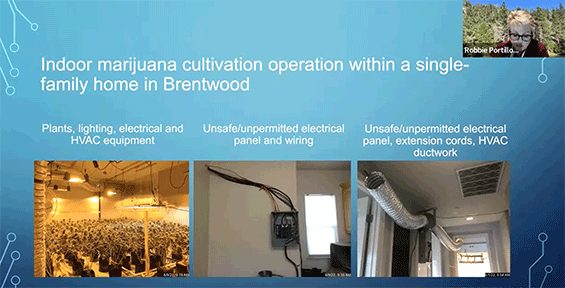On Tuesday, the Brentwood City Council approved additional penalties for illegal cultivation of marijuana within the city of Brentwood. The penalty is now $100 per plant over the legal limit.
Code Enforcement Supervisor Roberta Portillo-Bienemann explained to the council how the City of Brentwood has seen an increase in illegal marijuana grows inside single-family homes. Staff was seeking additional penalties to clarify they were seeking penalties on a per plant basis as a deterrent for illegal marijuana grows inside single-family homes.
Currently, State Law allows adults up to six (6) living plants and possess the marijuana produced by the plants. Since 2017, the city has regulated state law into the existing municipal code and levee fines.
Portillo-Bienemann explained Brentwood has seen an uptick in the number of indoor cultivation’s and work with Brentwood Police Department.
Currently, the City’s administrative citation fines are $100 for the first violation, $200 for the second violation and $500 for the third and subsequent violations of the Brentwood Municipal Code.
Portillo-Bienemann said the city was looking at using a new strategy being used by some cities to specify that each plant is subject to its own fine–$100 per plant vs. per violation. Each and every day a violation is maintained, caused, aided, abetted, concealed, suffered, or permitted is a separate offense.
Councilmember Jovita Mendoza asked about the number of plants found in homes which Portillo-Bienemann replied it could be hundreds to the thousands depending on if it was a grow house or not—including as many as 12,000 plants.
“If you catch someone, its $100 per plant per day, is that what I am reading,” asked Mendoza.
Portillo-Bienemann said its per violation, per plant.
“Usually when we go into one of these cultivation operations, we typically have 8-10 violations which is about $800 to $1,000 fine. Amending the code, we would be able to cite violations in addition to issuing a $100 fine per plant over the allowable six,” said Robbie Portillo-Bienemann. “If they have 706 plants, it would be 700 x $100 dollars per plant fine.”
Councilmember Susannah Meyer asked if someone does not have the money to pay, then what would happen.
Portillo-Bienemann said it would go to collection and possibly a lien against the property—ultimately it falls on the property owner and any potential buyer of a property would be aware of the violations against the property.
Councilmember Karen Rarey asked what the percentage of homeowners vs renters which staff said most violations are typically tenant occupied.
During council discussion, Mayor Joel Bryant explained that this updated ordinance does not include the six plants but having seen grow houses in the community, there is immediate danger to neighbors and health concerns from mold, but also have been violent interactions from criminal activity.
“I feel that if something is legal, I am a strong believer in individual rights, period! So, if that is something you want to do and its legal, by all means do it legally. But at the same time if you are going to come in and endanger our families, we need to really make sure we are the least attractive target for criminals to come in to this area to do criminal activities no matter what those activities.”
Bryant also stated he wished they could fine them $100 per leaf but understood he couldn’t do that.
Meyer said this ordinance did not impede anyone’s rights for recreational use and was in support.
The council approved the ordinance in a 4-0 vote with Vice Mayor Johnny Rodriquez absent.
The Process For Dealing with Grow Houses:
- When notified of a potential illegal grow house, the various law enforcement agencies conduct the criminal investigation, while Community Enrichment staff document the various life/safety concerns and unpermitted construction, and pursue administrative enforcement of the City’s Municipal Code.
- PG&E is contacted to disconnect the electricity and gas connection as needed,due to the unsafe/unpermitted conditions.
- A red tag is posted at the property, which restricts access until the required corrective actions are taken, which generally involve hiring a contractor to demolish all of the unpermitted construction and mold testing to identify the proper remediation work that is needed.
- Testing of the HVAC system is also required to ensure it functions properly after the illegal modifications are removed.
- Alterations are often required so that the home may be reverted back to its original permitted configuration, and approved for
- Administrative citation fines are charged for the code violations, and building permit fees are collected for both demolition and alteration permits.

